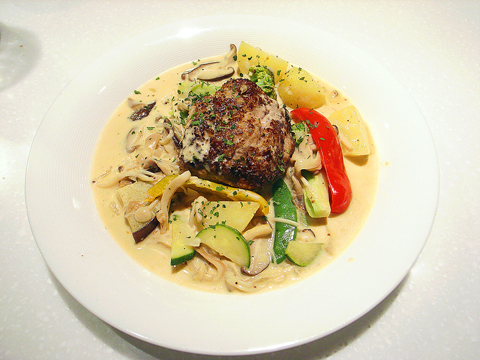Located in a surprisingly charming neighborhood in Dazhi (大直), Petit Park serves French-inspired cuisine at reasonable prices. The restaurant boasts an ambitiously large menu, with a wide selection of salads, pastas and sandwiches, presumably aimed at budget-minded diners (NT$150 to NT$380). The main courses are not especially imaginative, but they suit the atmosphere of the restaurant: stylish, yet down-to-earth.
There are hits and misses, but fortunately more hits.
The emphasis is on fresh foods and ingredients, and homemade bread features prominently in the sandwich and appetizer selections. The bread and pesto spread (also made fresh, NT$100) didn't disappoint, although they skimped a bit on the pesto.

PHOTO: DAVID CHEN, TAIPEI TIMES
An outstanding appetizer is the grilled duck with feta cheese and potato with a vinaigrette sauce (NT$160). The thin slices of duck melted in the mouth and married well the sashimi-sized chunks of peeled potato with zucchini slices layered beneath. The feta cheese cubes added a touch of savory richness, while a sprinkling of tarragon and red peppercorns gave the dish a subtle, spicy zest. Other appetizers include organic rocket with Parma ham and fresh bread (NT$160) and grilled scallop with pesto and organic tomato (NT$180).
Petit Park plays it safe with its main course offerings, but skip the grilled lamb (NT$320). The meat was too chewy and its strong flavor could not be tamed by the delicate, fresh mint sauce that accompanied the dish. It came with a side of stringy mushrooms cooked in butter and garlic sauce that was too salty. The restaurant's specialty, Japanese-style hamburger with French-style cream sauce (NT$280), however, was satisfying, much like a favorite comfort food. The pork meat patty had a firm consistency, but tasted tender. The side of potatoes and fresh vegetables (eggplant, broccoli, zucchini, and yellow and red peppers) blended nicely with the cream and garlic sauce. Other main course choices include grilled chicken leg served with capellini (NT$340), salmon with cream mushroom sauce (NT$360) and New Zealand Grade A tenderloin steak (NT$420).
Petit Park sports a modern-looking, minimalist decor - plain white walls, a black ceiling and large windows, but it's refreshingly unpretentious and feels homey with warm lighting and comfortable seating. The kitchen overlooks an open and spacious dining area; between the cooling racks that hold fresh-baked bread, diners can spot the cooks hustling about.
The two desserts on offer - mango with coconut pudding (NT$80) and tiramisu (NT$70) - are both pleasing because they are made of fresh ingredients. The tiramisu was delicious, but its consistency was too much like custard and not fluffy enough. Like the desserts, the drink selection is sparse - Coke, coffee, ice tea and wine by the bottle only (NT$700).
As for the service, the wait staff was polite and attentive but forgot to serve our drinks before dinner as requested. However, this minor shortcoming didn't overshadow the overall experience: an evening of good, inexpensive food (dinner for two, including appetizers, dessert, and coffee, was NT$1,000) in a relaxed and comfortable setting.
Dazhi might sound far away to those living in Taipei City, but Petit Park is just a 15-minute bus ride from Yuanshan MRT Station. The No. 72 and No. 208 buses run frequently: get off at Dazhi Station (大直站), just past the yet-to-open Dazhi MRT Station. Petit Park is on Lane 620 and, as its name implies, is located next to a park. This residential lane is also home to a handful of other mid-priced and upscale restaurants, and its clean, tree-lined sidewalks make for a pleasant after-dinner stroll.

On April 26, The Lancet published a letter from two doctors at Taichung-based China Medical University Hospital (CMUH) warning that “Taiwan’s Health Care System is on the Brink of Collapse.” The authors said that “Years of policy inaction and mismanagement of resources have led to the National Health Insurance system operating under unsustainable conditions.” The pushback was immediate. Errors in the paper were quickly identified and publicized, to discredit the authors (the hospital apologized). CNA reported that CMUH said the letter described Taiwan in 2021 as having 62 nurses per 10,000 people, when the correct number was 78 nurses per 10,000

As we live longer, our risk of cognitive impairment is increasing. How can we delay the onset of symptoms? Do we have to give up every indulgence or can small changes make a difference? We asked neurologists for tips on how to keep our brains healthy for life. TAKE CARE OF YOUR HEALTH “All of the sensible things that apply to bodily health apply to brain health,” says Suzanne O’Sullivan, a consultant in neurology at the National Hospital for Neurology and Neurosurgery in London, and the author of The Age of Diagnosis. “When you’re 20, you can get away with absolute

May 5 to May 11 What started out as friction between Taiwanese students at Taichung First High School and a Japanese head cook escalated dramatically over the first two weeks of May 1927. It began on April 30 when the cook’s wife knew that lotus starch used in that night’s dinner had rat feces in it, but failed to inform staff until the meal was already prepared. The students believed that her silence was intentional, and filed a complaint. The school’s Japanese administrators sided with the cook’s family, dismissing the students as troublemakers and clamping down on their freedoms — with

As Donald Trump’s executive order in March led to the shuttering of Voice of America (VOA) — the global broadcaster whose roots date back to the fight against Nazi propaganda — he quickly attracted support from figures not used to aligning themselves with any US administration. Trump had ordered the US Agency for Global Media, the federal agency that funds VOA and other groups promoting independent journalism overseas, to be “eliminated to the maximum extent consistent with applicable law.” The decision suddenly halted programming in 49 languages to more than 425 million people. In Moscow, Margarita Simonyan, the hardline editor-in-chief of the